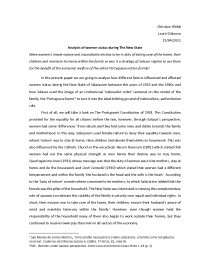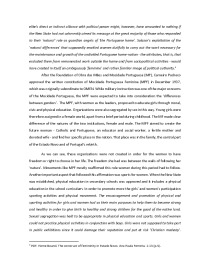Analysis Of Women Status During The New State



Analysis of women status during The New State. Bibliography.
Were women’s innate nature and unavoidable destiny to be in duty of taking care of the home, their children and maintain harmony within the family or was it a strategy of Salazar regime to use them for the benefit of the economic welfare of the entire Portuguese nation-family?
In the present paper we are going to analyze how different factors influenced and affected women status during the New State of Salazarism between the years of 1933 and the 1960s and how Salazar used the image of an institutional 'nationalist order' centered on the model of the family, the 'Portuguese home' to turn it into the ideal birthing ground of nationalistic, authoritarian rule.
First of all, we will take a look on The Portuguese Constitution of 1933. This Constitution provided for the equality for all citizens before the law, however, through Salazar’s perspective, women had some ‘differences’ from nature and they had some roles and duties towards the family and motherhood. In this way, Salazarism used female nature to deny their equality towards men, whose ‘nature’ was to stay at home, raise children and devote themselves to housework. This was also influenced by the Catholic Church in the encyclicals Rerum Novarum (1891) which stated that women had not the same physical strength as men hence their destiny was to stay home, Quadragesimo Anno (1931) whose message was that the duty of women was to be mothers, stay at home and do the housework and Casti Connubii (1930) which stated that women had a different temperament and within the family ‘the husband is the head and the wife is the heart’.
















